By former and current Grok staff
The history of Grok Magazine, the official student publication of Curtin University, begins exactly 50 years ago, in April 1969, only a couple of months after the creation of the Western Australian Institute of Technology (WAIT) Student Guild.
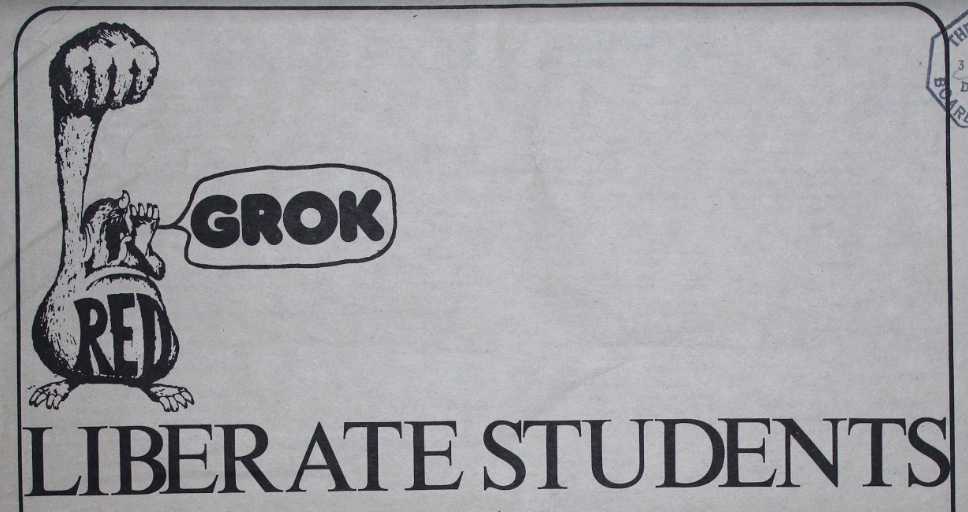
Part of the cover of the third issue of Grok in 1972, with the first design of Grok’s logo.
The Guild and Grok have therefore almost always been united as representatives and voices of the students at Curtin (formerly known as WAIT), for as long as the university itself has existed.
In the summer of ‘69, Grok, then called Aspect, was a newspaper run by fairly conservative students, who completed their first print run of 5,000 copies for $458; adjusting to inflation rates today, that would be around $5,500 now.
Aspect simultaneously represented the rebelling voices of the students, who strived for more Common Free Time and an Orientation Week, but with strong elements of Liberal (with a capital ‘L’) ideologies.
Yet the student-run newspaper also covered outrageous student antics, and all sides of the political spectrum could agree that terrorising WAIT staff was hilarious.
George James Week, a “week of student frivolity and bonding to rival the best that the UWA ‘Prosh’ could generate”, was celebrated with students living on the St George’s Terrace and James Street housing sites coming together to plot treasure hunts.
This included removing hinges from staff member’s doors and even ‘capturing’ senior officials.
The decade of the 70s brought with it great change, however; in 1972 a new editor, Rod Cole, conspired to change the name of Aspect to Grok, bringing with him considerably far more left-wing, progressive views.
A few more name changes did occur over time, but nothing stuck for long, and neither did its politics waver: Grok was to become the well-known, on-campus name for the student publication, with a reputation for generally centre-left and left-wing, passionate ideals; groovy art, film and music reviews; and a desire to tell as many diverse stories as possible.
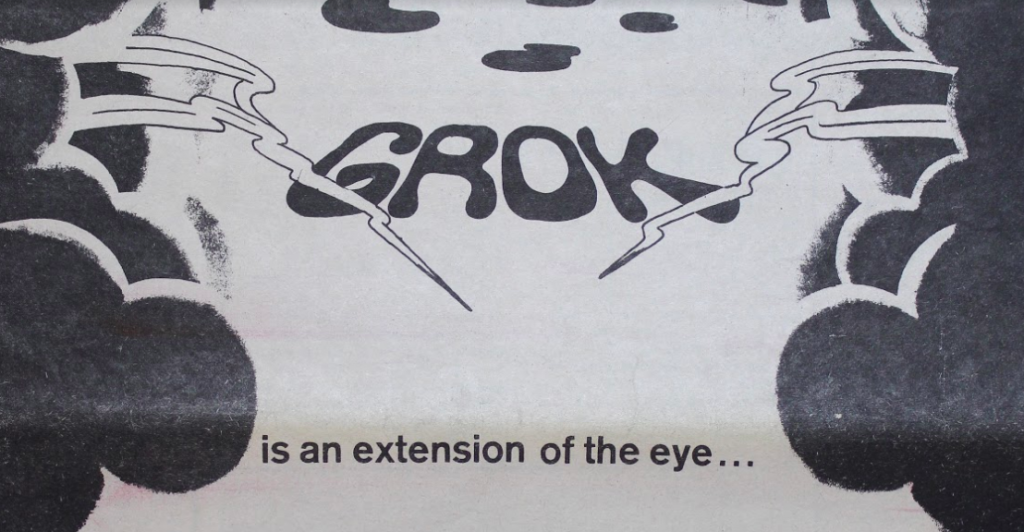
Part of the cover of Grok, 1973, Volume 5, Number 1.
The word Grok itself came from one of Coles’ favourite novels, and a popular sci-fi read at the time: Stranger in A Strange Land, by Robert A. Heinlein.
Published in 1961, the novel was of the proto-hippie genre—a celebration of free love and counter-cultural rebellion.
It follows Valentine Michael Smith, a human born on Mars and raised by Martians who comes to Earth in early adulthood.
Heinlein coined ‘grok’ to mean ‘to drink’ in Martian. But, more specifically, it meant to take something in so thoroughly that it becomes a part of you.
‘Grok’ was later incorporated into English-language dictionaries as a verb, used with object, “to understand thoroughly or intuitively”.
Or, as the 1979 Editor wrote somewhat exasperatedly to his confused readers: “Grok is far more significant than a mere four letters thrown together by a drunken egotist in some distant past… in shorthand, [Grok means] to communicate fully, have full understanding.”
Grok was to cover a decade of great turmoil, suffering, liberation and counter-culture rebellion (standing in line with its novelistic name-origins).
The pages of the 70s were filled with anti-conscription politics and advice, protests against police brutality and South African apartheid, support for gay rights, women’s liberation, Aboriginal rights, and the Palestine Liberation Organisation.
A particularly interesting but inconspicuous note in one of the 1972 editions was a call out for people to offer up their residences as hiding places for young men who were “dodging the draft”—avoiding conscription to the Vietnam War. This was organised in conjunction with Cole and the Guild Welfare Committee Chairman at the time, Paul Bridges.
It was common for many of these issues to also be supported by the Student Guild, and regular contributions were made to the magazine by Guild presidents and officers.
But as Garry Feeney, the Sports Editor for Grok in 1972 described it, writing for the magazine and serving the Guild was like being on “another planet.”
The contributors and the officers were the “people who were in everything. We did the parties, the drugs, the protests and demos, student politics, the student newspaper and the dramatic society.
“There was a lot of crossover. The editor of Grok was the sound and lighting guy for the plays we did.”
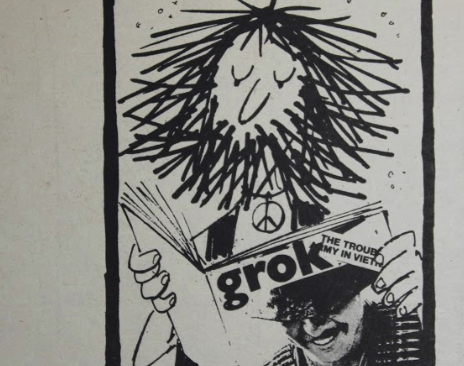
Image printed in Grok 1972, Volume 4, Number 5.
Despite regular complaints written in the magazine about the majority of the student body’s political apathy towards Guild politics and WAIT education policies, the reoccurring spark that lit every student’s fuse was parking on campus.
Grok often argued that fees and fines were too high, there weren’t enough bays, and the WAIT staff’s parking priorities always superseded those of the students.
From 1971 to 1972, enough was enough, and the students ripped every parking sign on campus out of the ground and dumped them into a lake.
The car of the Dean of Business Studies was abandoned in a sea of sand in the nearby pine plantation.
In 1974 Grok temporarily became PaperWAIT, under the more right-leaning editorial guidance of Roy Morien, who gleefully pronounced in that year’s Number 8 issue, “GROK is DEAD! PaperWAIT is BORN!”
Other name changes were to occur in 1982 when Grok went to France and back and became Le Grok, and then L’Grok; in 1988 it was renamed Aliwa, which is a Noongar word meaning ‘look out’, or ‘be aware.’
The name Grok was reinstated after a referendum voted against the name being ‘Aliwa’.
Debate raged about the naming of the paper on the Guild council, with member Andrew Waddell calling the idea “horrific” and “blatant tokenism”; Peter Grant sided with him, saying Grok was doomed to be mediocre if they changed the name.
On the other side of the table, Darren Foster suggested instead of ‘Aliwa’, perhaps the paper could be called ‘Yagan’, after the great Noongar resistance leader.
Foster said, “An Aboriginal name is an Australian name. It is timeless and will continue as long as the Aboriginal people continue.”
Nevertheless, the votes stopped the idea of a name-change in its track, and the paper has continued to be called Grok.
Over the next half century, Grok became a mainstay at Curtin, regularly reporting on Guild politics and elections, controversies and successes, international news and demonstrations, capitalism and socialism, left- and right-wing national policies, rising prices and further cuts to education, minorities’ rights, and issues concerning all student’s welfare.
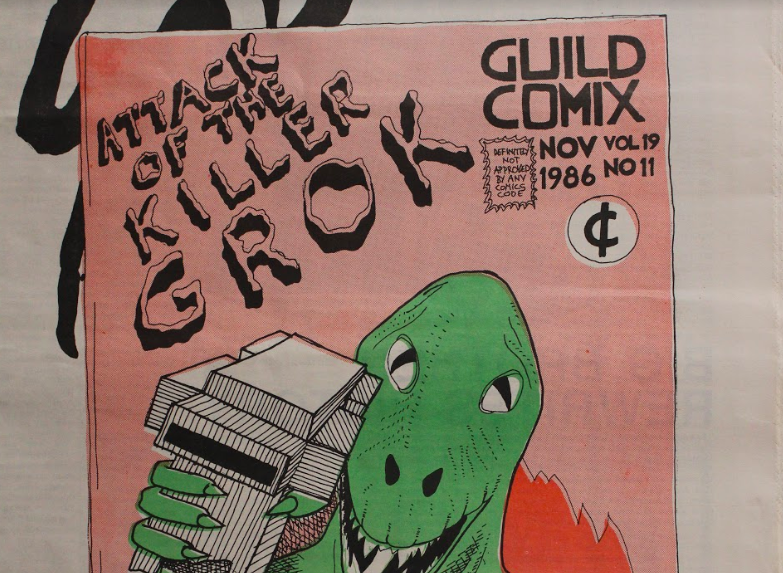
Part of the cover of Grok. 1986, Volume 19, Number 11.
Grok also produced a weekly information booklet, suitably called the Grokette, which was distributed around campus with updated news on student activities, advertisements, information about council meeting times, and official Guild notices.
The Grokette kept students informed on their campus’ proceedings until its existence was brought to an end in 1988.
Perhaps two publications were one too many to concentrate on, as 1988 was the same year that the first HECS fees (commonly referred to then as the ‘Graduate Tax’) were introduced.
Before then, studying at university in Australia was almost completely free.
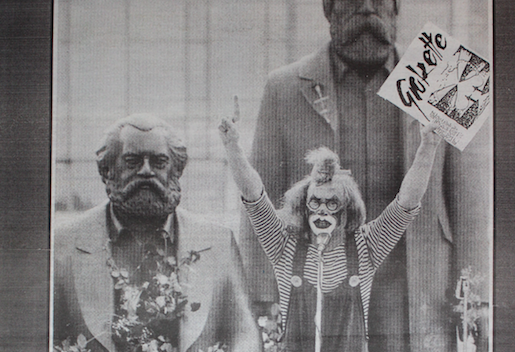
Advertising Grokette. Published in Grok 1991, Volume 25, Issue 10.
Grok also fostered the writing and journalistic dreams of many. One of Australia’s most well-known and widely celebrated authors, Tim Winton, first published one of his short stories, ‘The Woman at the Well’, in Grok’s 1979, Number 8 Edition, while he was studying at WAIT himself.
Grok regularly published student’s short stories and creative fiction in a column called ‘Naked Eye’, which Winton also edited.
‘The Woman at the Well’ was submitted years before the story was formally published in ‘Scission’, a collection of Winton’s short stories.
Another of his fictional pieces, titled ‘Seven Tens’, was published in 1980’s May edition, but remains unpublished elsewhere. Neither was his short story ‘The Happiest Man in the World’, submitted to Grok 1982, Number 2; but it did win second place in that year’s Guild’s short story competition.
In 1979, an entirely women’s run edition of Grok was published: Volume 12, Number 7, to be exact. This was edited by Barbara Weimar, the Guild’s Women’s Officer, and her magazine was highly provocative; page 23 showed a photograph of a woman who had died after an attempt at self-abortion.
The publication was a brave attempt at sparking conversations around women’s liberation, equality and women having control over their own bodies and lives.
Women’s publishing continued in the shape of Speculum, a paper written by women and about women, seemed to appear in the mid-1980s, and has continued to be printed by the Guild’s Women’s Department sporadically in the decades following.
In recent years, the magazine has been called Athena, and was published under the direction of Grok in 2018.
Returning to the ‘80s, however, collaboration continued, and in 1981 a state-wide, cross-campus newspaper was created, called the Inter Campus Express, or ICE (later known as X-Campus). This was managed by the different university’s editors, such as Jo Taylor, Ray Brindal and Rupert Day.
Grok, alongside the other student publications, contributed various stories and news that would seek to further expand their audience and improve the quality of their journalism.
The main stories that were contributed were around the increasing cuts to education the government of the day were pursuing.
Grok, through ICE, reported that 800 students and staff met at WAIT to discuss the new cuts; meanwhile, 1000 students from the Social Sciences Department decided to skip school and attend a protest meeting instead.
Other ICE articles were less than newsworthy, with the collaborative effort of Grok and Pelican (UWA’s student newspaper) culminating in a report on UWA’s Guild President Steve Wakeham being tied up and then thrown into WAIT’s ornamental pool (with a photo series to prove it).
Throughout the years Grok has always been there to cover the newest bands and the latest tracks, both in Perth, and way beyond our isolated borders.
Memorable articles from 1982’s newspapers include interviews with Perth’s very own The Triffids in Le Grok, and an interview with INXS’ guitarist in X-Campus.
In the early ‘80s these music reviews were spearheaded and delivered with passion by Grok’s Craig Reardon, who created a music column called ‘Sessions,’ dedicated specifically to reviewing and talking to local Perth bands and musicians.
Another noteworthy interview came from Juliette Conroy, who spoke to Hunters and Collectors band members in 1985’s Number 5 edition.
While Barbara Weimar had edited one of the editions for Grok in 1979, it wasn’t until 1985 that the student newspaper came under the leadership of a full-time woman editor: Carolyn Thomson.
With the help of Linzi Pearce, and with more women behind Grok than ever before, these were the first women to represent student voices on campus in a serious way.
She was also perhaps the first to publish in Grok personal disputes between themselves and the Guild about their alleged censorship of the paper. Placed beside articles about UWA’s Guild shutting down their own student magazine, Pelican, Thomson published letters written to her by the then WAIT Guild President Stuart Sturgess, writing that the Guild was now reviewing all Grok content before publication and effectively censoring their newspaper.
He was sarcastically noted by Thomson in Number 6’s edition as the ‘Official Censor.’
Her strong words were quickly disputed by Sturgess in defence of his integrity, and the truth of the matter went unresolved.
Graham Senders, Thomson’s successor, tried to clarify the issue of the relationship between Grok and the Guild in 1986, saying that “GROK is the newspaper of the Student Guild. It boasts this quite proudly and openly. It is not, however, the mouthpiece of the Student Guild, something quite different. Contributors to GROK may criticise the Guild, they may laud the Guild, or they may ask what the Guild is and what it is doing.”
But as Senders so astutely wrote in 1987, “… yes, in Grok, our style is to cut the bullshit.”
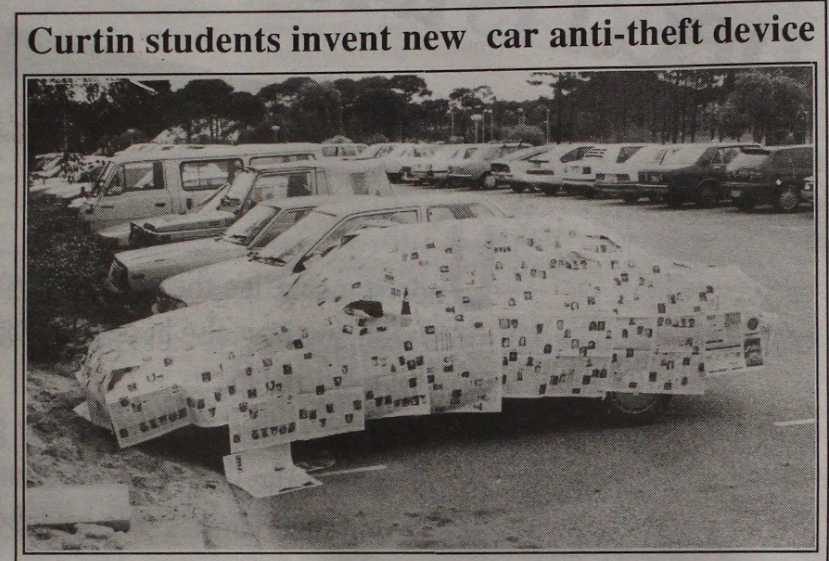
“… any publication from the Guild Media Office proves an effective deterrent to unwanted attention. Editions of Grok worked well and the Guild election broad-sheet was guaranteed to stop anyone coming within twenty yards of your vehicle.” 1991, Number 11.
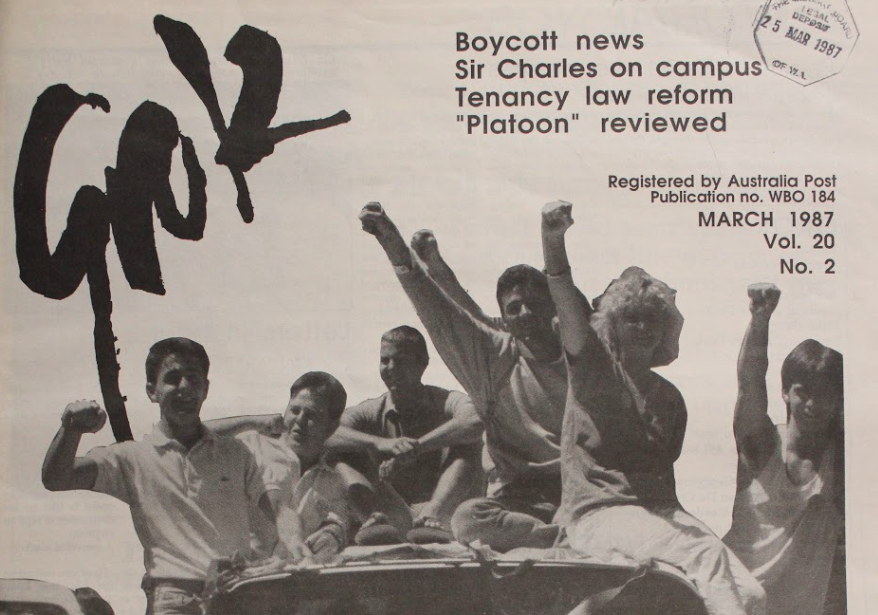
Part of the cover of Grok. 1987, Volume 20, Number 2.
Yet the challenges for the paper weren’t over. When the ‘90s rolled around, Grok hit another ‘censored’ wall, after they published an article on breast cancer, which featured a photograph of a woman’s breasts.
As a result, the magazine was banned on Edith Cowan University’s (ECU) campus; the ban was re-instated once again in 1995, when Grok covered the resignation of ECU’s Guild’s general manager.
But as ‘95’s Editor Adam Connors described it, Grok was always the “get-yourself-in-trouble, push-the-boundaries, tackle-the-hard-topics-around-student-unionism-and-sexuality, and hold-the-Guild-accountable” kind of magazine.
Connors was also partly responsible for putting up the first editions of Grok online in 1995 and again in 1996; the Internet was only just beginning to be talked about back then, and the online editions of Grok were some of the first websites ever made—among the first 2000, according to Connors.
Looking back over the magazine, not only has it captured the growth and evolution of the Student Guild and Curtin University, but it has also captured pieces of Australian society, through its articles, reports, poems, short stories, designs, photographs and reviews.
To look through Grok is like looking through the contents of a time capsule holding snippets of our shared humanity.
So, have a flick through the old Grok’s and the new, as we present to you our exhaustive time capsule of the good, the bad, the ugly, and all the sweaty, ‘in-ya-face’ journalism in between.
This article was written and edited by Grokians, or as 1990 Editor Serene Conneeley described us: “a group of coffee-stained, highly over-worked, highly under-sexed, insomnia-stricken journalists and editors … It is their tireless efforts that keep the info and coffee flowing freely.” Truer words were never written.
Originally published by Curtin Student Guild
See also: In conversation with former Grok editor Adam Connors
